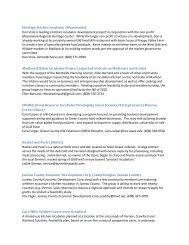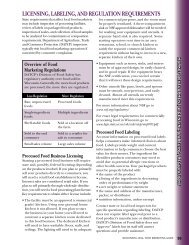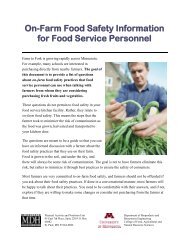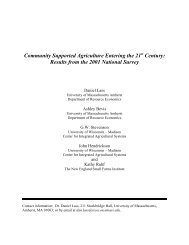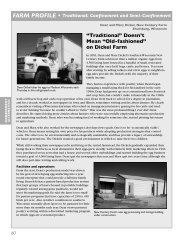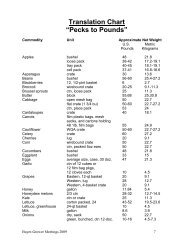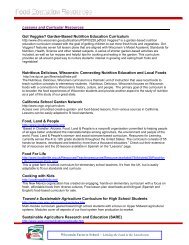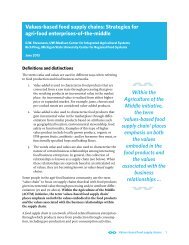Poultry Your Way - Center for Integrated Agricultural Systems ...
Poultry Your Way - Center for Integrated Agricultural Systems ...
Poultry Your Way - Center for Integrated Agricultural Systems ...
Create successful ePaper yourself
Turn your PDF publications into a flip-book with our unique Google optimized e-Paper software.
MARKETING<br />
ALTERNATIVES<br />
24<br />
<strong>Poultry</strong> <strong>Your</strong> <strong>Way</strong><br />
MARKETING ALTERNATIVES<br />
Legal Considerations<br />
Products that come from animals are perishable and what regulators call “potentially hazardous foods.” This means<br />
that disease-causing bacteria will multiply quickly unless controlled (Lehnert, 2002). For this reason, state and<br />
federal food safety rules have been designed to protect consumers from food-borne pathogens. Food safety rules<br />
control which products must be inspected, as well as how they should be packaged, labeled, and stored. In short,<br />
regulations limit what you can sell and where. You must check with the regulatory agency in your state to<br />
determine the rules you must follow (see Figure 13.)<br />
Packaging and labeling. Farmers who sell eggs generally are permitted to use secondhand cartons as long<br />
as the cartons are clean and in<strong>for</strong>mation relating to the original packer is removed (particularly pack dates and<br />
freshness dates). In Michigan, however, growers are strongly encouraged (though not required) to purchase<br />
new cartons when selling eggs anywhere off the farm. If you do recycle cartons, new labels with the farm name,<br />
address, egg grade, egg size, pack date (in Julian calendar <strong>for</strong>mat with 1 to 365 days) and a “freshness” or expiration<br />
date (not to exceed 30 days from the pack date) must be added when selling through a retailer. Moreover, the<br />
following safe handling language is legally required by the Food and Drug Administration on all cartons packed <strong>for</strong><br />
retail sale: “To prevent illness from bacteria: keep eggs refrigerated, cook eggs until yolks are firm, and cook foods<br />
containing eggs thoroughly.” While this may seem cumbersome, it is law and will af<strong>for</strong>d you some legal protection<br />
should a customer become ill due to improper handling. Preprinted handling labels describing how to store and<br />
prepare eggs are available from www.eggcartons.com.<br />
Packaging regulations <strong>for</strong> poultry and other meat products were established to maintain freshness, quality, and<br />
food safety. Packaging chemicals and colorants can migrate to food and <strong>for</strong> this reason are considered an indirect<br />
additive. All additives must be approved by the U.S. Food and Drug Administration (FDA). <strong>Poultry</strong> and other meat<br />
processors are required to use FDA-approved packaging materials and maintain on file a “statement of assurance”<br />
or guarantee from the packaging supplier to verify that packaging meets codes under the Federal Food, Drug and<br />
Cosmetic Act (USDA, Food Safety and Inspection Service [FSIS], 2000).<br />
Desenses’ organic chickens <strong>for</strong> sale at the Minneapolis Farmers’ Market.<br />
All poultry meat packaging must be labeled with<br />
the product identity and the state or federal<br />
processing inspection label (if applicable). Product<br />
identity includes the name, address, and zip code<br />
of the farmer, packer, or distributor. All labels must<br />
be submitted <strong>for</strong> approval to the respective state<br />
or federal inspector at the processing plant (where<br />
applicable) prior to using the inspection legend<br />
on any packages (MDA, www.mda.state.mn.us/<br />
dairyfood/factsheets/eggsafety.htm). Additionally,<br />
federal law created under the Nutritional Labeling<br />
and Education Act, states that all processed<br />
products must include a nutritional label on the<br />
packaging. There is a small business exemption,<br />
however, that applies to the majority of farmers<br />
who direct-market their products; nutritional labels<br />
are not required if the farm’s total annual sales<br />
(of food and nonfood products) totals less than<br />
$500,000 per year, or if the total annual food sales<br />
amount to less than $50,000 per year (Hamilton,<br />
1999) (see Resources under Labeling).




